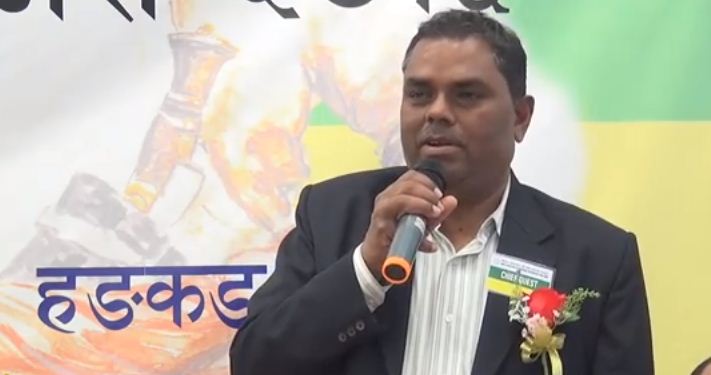Upendra Yadav made factual mistakes in his Hong Kong speech
Sujit Mainali / February 23, 2016

Federal Socialist Forum-Nepal chief Yadav speaking at a function in Hong Kong on February 14. Photo: Youtube video grab
Federal Socialist Forum-Nepal Chairman Upendra Yadav, while addressing a function in Hong Kong on February 14 made the following four assertions to substantiate his claim that Nepal as a state favors the Khas-Nepali language speakers only:
- If you look at the bureaucracy of Nepal, you can see that a community, which comprises just 12 percent of the total population, occupies 64 percent of the posts.
- All the political appointments are distributed among the one, two ethnic groups only.
- [Only] the language of the one, two ethnic groups has been made the language of the nation.
- (Only the language of the one, two ethnic groups] has been made the language of official business.
Click here to listen to the speech:
South Asia Check has examined whether these assertions are fact-based or not:
First Assertion: If you look at the bureaucracy of Nepal, you can see that a community which comprises just 12 percent of the total population occupies 64 percent of the posts.
Chairman Yadav’s indication here is toward the Hill Brahman community, which comprises 12.20 percent of the total population.
According to a report released by the Department of Sociology/Anthropology of the Tribhuvan University in 2014, the Hill Brahman community occupies 39.226 percent of the total posts in Nepal’s bureaucracy.
Therefore, Yadav’s first assertion is wrong.
Second Assertion: All the political appointments are distributed among the one, two ethnic groups only.
By saying ‘one, two ethnic groups’, Chairman Yadav has hinted toward Hill Brahman and Hill Chhetri communities.
To check whether this assertion is fact-based, we studied the ethnic representation in the councils of academicians at the Nepal Academy and the Nepal Academy of Music and Drama as samples.
In these two academies, the councils of academicians are formed through political appointments.
Academician Shrawan Mukarung* is a member of council in the Nepal Academy and he is from the Rai community. Prof Dr Usha Thakur is another member of the council and she belongs to the Madhesi community.
Similarly, the council of academicians at the Nepal Academy of Music and Drama has Udaya Shrestha (from Newar community), Pabitra Gharti (from Magar community), Pushkar Bahadur Gurung (from Gurung community), Madhav Pradhan (from Newar community), Ramesh Ranjan Jha (from Madhesi community) and Ganesh Rasik (from Rai community) as its members, along with others.
The chancellor of the council is Bhakta Shrestha (Sarubhakta), who is from the Newar community.
So Chairman Yadav is again wrong in saying that all the political appointments are distributed among the one, two ethnic groups only.
Third Assertion: [Only] the language of the one, two ethnic groups has been made the language of the nation.
While saying “the language of those one, two ethnic groups”, Chairman Yadav’s indication was toward the Nepali language written in Devanagari script and spoken by the Hill Brahman and Hill Chhetri communities.
But Article 6 of the Constitution of Nepal 2015 has mentioned that “all the mother tongues spoken in Nepal shall be national languages.”
Thus, Chairman Yadav is again wrong in claiming that only the Nepali language written in Devanagari script has been made the language of the nation.
Fourth Assertion: (Only the language of those one, two ethnic groups] has been made the language of official business.
Article 6, Clause 1 of the Constitution of Nepal 2015 has mentioned that “Nepali language written in Devanagari script shall be the language of official business in Nepal.”
Similarly, Clause 2 has further mentioned that “in addition to Nepali language, a province may select one or more national languages that are spoken by majority of people in that province as the language of official business.”
Chairman Yadav is partially correct in saying that the Nepali language written in the Devanagari script is the only language of official transaction, since the constitution has allowed provinces to make any other mother tongue(s) the language of official business within the provinces.
*Corrected: Earlier we had mistakenly identified Mukarung as Limbu.
This material is copyrighted but may be used for any purpose by giving due credit to southasiacheck.org.
Comments
Latest Stories
- In Public Interest Covid-19 cases are low, but that’s not an excuse to avoid vaccination
- In Public Interest What is BF.7, the sub-variant that has the world by its grip?
- In Public Interest Threat of a new Covid-19 wave looms large amid vaccine shortage in Nepal
- In Public Interest As cases decline, Covid-19 test centres in Kathmandu are desolate lot
- In Public Interest Dengue test fee disparity has patients wondering if they’re being cheated
- In Public Interest As dengue rages on, confusion galore about what it is and what its symptoms are. Here’s what you need to know
In Public Interest
 Covid-19 cases are low, but that’s not an excuse to avoid vaccination
The Pfizer-BioNTech bivalent vaccines authorised by the Nepal Government provide better protection a...
Read More
Covid-19 cases are low, but that’s not an excuse to avoid vaccination
The Pfizer-BioNTech bivalent vaccines authorised by the Nepal Government provide better protection a...
Read More
- What is BF.7, the sub-variant that has the world by its grip?
- Threat of a new Covid-19 wave looms large amid vaccine shortage in Nepal
- As cases decline, Covid-19 test centres in Kathmandu are desolate lot
- Dengue test fee disparity has patients wondering if they’re being cheated
- As dengue rages on, confusion galore about what it is and what its symptoms are. Here’s what you need to know